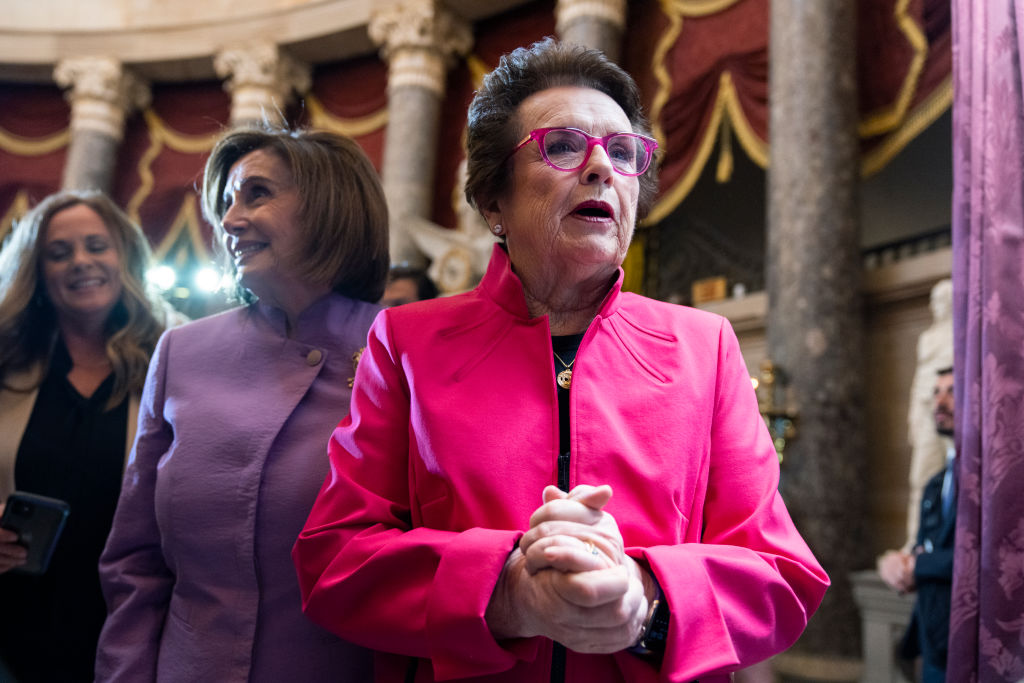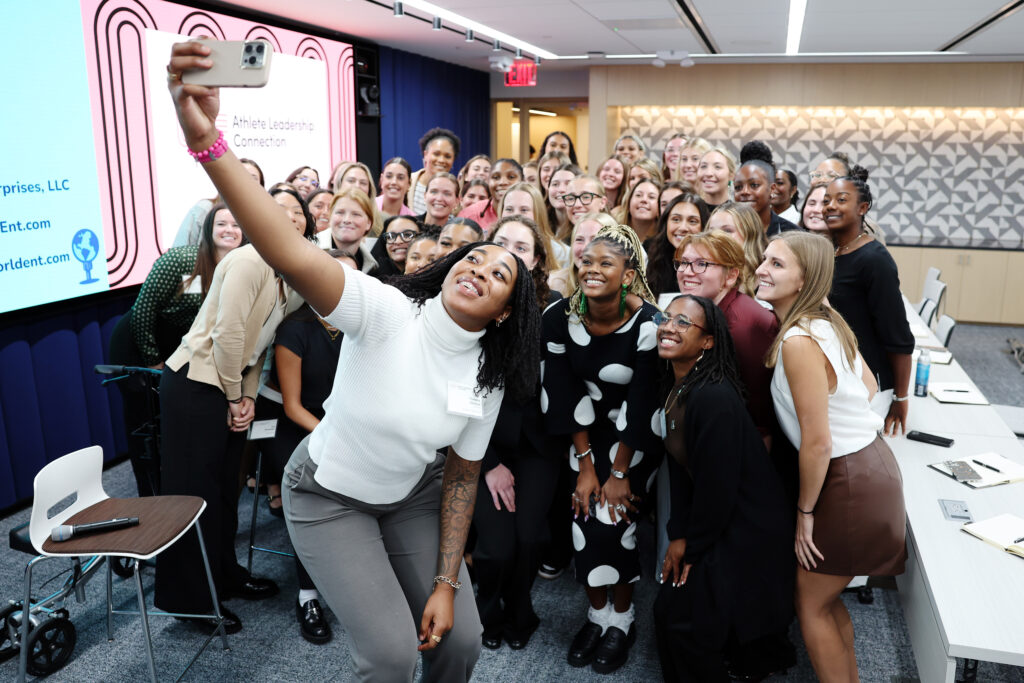The Women's Sports Foundation (WSF) is celebrating National Girls & Women in Sports Day (NGWSD) this week in Washington, DC
Founded by Billie Jean King in 1974, the organization held the first NGWSD 39 years ago. To "amplify the monumental moments being seen across women's sports," the WSF arranged local programming honoring the February 5th event.
This year's edition kicked off yesterday with a youth sports clinic led by the WNBA's Washington Mystics and AU student-athletes. Other activations included a panel discussion and workshops.
"For 50 years and counting, the Women's Sports Foundation's vast research has continued to prove that a powerful way to positively impact society's future is by investing in girls' and women's sports," said WSF CEO Danette Leighton.
"This National Girls & Women in Sports Day, we are back in the nation's capital to both celebrate the momentum throughout the women's sports ecosystem and to ensure progress continues, so that all girls and women have a chance to play and reap the lifelong benefits of sport."

WSF spends National Girls & Women in Sports Day on Capitol Hill
Today, WSF leadership, athletes, coaches, and industry pros met with members of Congress on Capitol Hill. They discussed the issues impacting women's sports athletes, proposed legislation to level the playing field, and the economic benefits of sports equity.
Participants across the week's events include: WSF president and Paralympian Scout Bassett; WNBA legend and Mystics Hall of Famer Alana Beard; Women's College World Series champion Rachel Garcia; Hall of Fame NCAA women's basketball head coach Muffet McGraw; and two-time NWSL champion Mana Shim, among others.
"As a Paralympian, I know more must be done to get additional girls and women in the game and advocate for policies that bolster inclusion and eliminate barriers, especially for those with disabilities," said Bassett. "It is my hope that National Girls & Women in Sports Day encourages positive conversations that will lead to lasting change so all girls and women can play, compete and lead — in sports and beyond."

Promoting inclusion for all women's sports athletes
WSF sets itself apart from recent political initiatives focused on prohibiting trans athletes from participating in sports in accordance with their gender identity. Instead, the foundation outspokenly advocates for the inclusion of trans and intersex women's sports athletes.
Accordingly, in a 2016 position statement, the foundation said that it "supports the right of all athletes, including transgender athletes, to participate in athletic competition that is fair, equitable, and respectful to all."
The WSF doubled down in 2022. They subsequently penned a letter to the NCAA imploring them to revise their exclusionary Transgender Athlete Participation Policy.
25 additional organizations endorsed the pro-inclusion letter. Together, they echoed the WSF motto "All girls. All women. All sports."
Nate Tibbetts is the new head coach for the Phoenix Mercury. But his hiring has been greeted with heated discourse over gender bias.
Despite coming to the WNBA with no head coaching experience and no women’s basketball experience, Tibbetts, 46, is set to become the highest-paid coach in the league, ESPN reported. He succeeds interim head coach Nikki Blue, who took the helm after Phoenix fired head coach Vanessa Nygaard in June.
Former Notre Dame women’s basketball coach Muffet McGraw took to social media following the news to call out the inequities baked into the coaching pipeline.
“Breaking news: white man hires white man to coach WNBA team AND makes him the highest paid coach in the league. Gender bias is real,” she wrote. “95% of men’s sport coaches r male and 60% of women’s sport coaches r male- title IX is 50 yet we don’t have equal oppty, equal pay or equal rights.”
Breaking news: white man hires white man to coach WNBA team AND makes him the highest paid coach in the league. Gender bias is real. 95% of men’s sport coaches r male and 60% of women’s sport coaches r male- title IX is 50 yet we don’t have equal oppty, equal pay or equal rights. https://t.co/eqtwdvot44
— Muffet McGraw (@MuffetMcGraw) October 18, 2023
This isn’t the first time McGraw has called out this issue. Back in 2020, she spoke with The Athletic about the “coaching crisis” in women’s basketball, pointing out the shift in the head coaching ranks from women to men.
In 2020, just four of the 12 head coaches in the WNBA were women. And there was just one Black female coach in the league. The league has shifted since then; at the end of the 2023 season, nine of the 12 coaches in the league were women, and three of them were Black.
Up until Tibbetts’ hiring, Becky Hammon was the highest-paid head coach in the league – and with the Aces winning back-to-back titles in her first two seasons, a pay raise may be in her future.
For now, though, Hammon will be dethroned as the highest-paid coach by Tibbetts. And while he could turn out to be exactly what Phoenix needs, his hiring by new Mercury owner Mat Ishbia — and his new general manager Nick U’Ren — has raised eyebrows.
“I really believe that people hire people who look like them,” McGraw told The Athletic in 2020.
To add to the furor, the Mercury used the moniker “girl dad” to describe Tibbetts in their social media announcement of his hire, as if that is a relevant qualification for a head coach of a professional basketball league.
“Imagine if Boy Mom was a qualification for coaching in the WNBA,” wrote one social media user.
“You’re touting being a ‘Girl Dad’ as a qualification? You’re hiring someone with zero experience in the women’s game? AND you’re announcing it the night of Game 4?” wrote USA Today Sports columnist Nancy Armour. “Tell me you don’t care about women’s sports without telling me you don’t care about women’s sports.”
Muffet McGraw opens up about her ongoing fight for gender equity in women’s basketball on the latest episode of NETLIFE with host Dawn Staley.
The former Notre Dame coach drew widespread attention in 2019 when she said she wouldn’t hire another man to her coaching staff. Her stance hasn’t changed on the issue.
“I really believe that for these young women that we’re coaching, they have to be able to look up and see somebody that looks like them,” McGraw tells Staley. “They have to see women in power positions, in leadership positions because that is showing them that they can do it, too.”
While there has been a heightened focus on women coaches breaking barriers in the men’s game, McGraw’s focus remains on women’s basketball.
“Why do people look at it as if going to the WNBA is a step down? That’s our game, that should be the pinnacle of our game,” McGraw says. “I would love to see a lot of those assistants in the NBA come over and be head coaches on the women’s side.”
Becky Hammon, a longtime assistant on Gregg Popovich’s San Antonio Spurs staff, recently returned to the WNBA, where she played for 16 seasons, as the new head coach of the Las Vegas Aces.
“We need more women in charge,” McGraw says.
Inequality in collegiate sports has been a heavily debated topic since Oregon’s Sedona Prince posted a video to social media showing the disparities between the weight rooms at the men’s and women’s NCAA basketball tournaments last year. The uproar over the viral video led to a reckoning within the NCAA and several reformative measures, including a gender equity report and the implementation of March Madness branding at the women’s tournament.
“The NCAA says it’s problematic because nobody is in charge of looking at the men’s and women’s tournament and saying, ‘Wait a minute, there is something wrong here,'” McGraw says. “They didn’t even notice.”
The Hall of Fame coach implores those involved in women’s sports to continue addressing inequities head on and bringing attention to ignored issues.
“We had to speak out, and since we started to speak out, things are starting to change,” she says. “You have to have those uncomfortable conversations if we want to change our game, if we want to grow our game. We have to point out the inequities in everything, across the board.”
Listen to the full conversation between McGraw and Staley on the coaching pipeline, the NCAA and growing the game on NETLIFE.